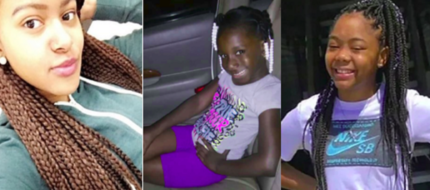
Their findings suggest that there is a direct correlation between a young girl’s skin color and how severe her consequences are for behavioral issues in school.
Black students received much harsher punishments on average than young white girls who were accused of the same action.
Researchers’ analysis of data from the National Longitudinal Surveys of Youth and the National Longitudinal Study of Adolescent Health have confirmed what one Georgia family knows all too well.
When two classmates, one Black and one white, were punished for the same incident, one was faced with a disciplinary hearing and charges for trespassing while the other barely received a slap on the wrist.
Mikia Hutchings, an African-American girl from Stockbridge, Georgia, was described as a great student by her teachers and even has a report card that reflects those sentiments, the NY Times reported, but when the 12-year-old allegedly scribbled “Hi” on a bathroom stall door she was treated as if she was simply a pint-sized criminal.
The incident happened last year at Dutchtown Middle School in Henry County but it’s something that still remains fresh in the little girl’s mind as well as her grandmother’s.
School officials said both Mikia and her friend were guilty of vandalism, suspended for a few days and asked to pay $100 in restitution.
Mikia’s family, on the other hand, disputed the accusations of vandalism and couldn’t pay the $100 fine.
From that point forward, the girl’s punishments would have nothing in common.
While her friend returned to school and things went back to normal, Mikia’s grandmother and legal guardian, Kenji Roberts, was served with papers by the local Sheriff’s Department that not only accused the young girl of defacing property but also warned that her misdemeanor charges had the potential to become felony charges.
Mikia and her grandmother accepted a deal to have the charges dropped if the young girl admitted to criminal trespassing, completed 16 hours of community service and wrote an apology letter to another student whose shoes were defaced in the incident.
“I only wrote one word and I had to do all that,” Mikia said, according to the NY Times. “It isn’t fair.”
The lawyer who represented Mikia after the incident, Michael J. Tafelski, said it was the type of situation that he never sees with white students.
“I’ve never had a white kid call me for representation in Henry County,” Tafelski said. “What kid needs to be having a conversation with a lawyer about the right to remain silent? White kids don’t have those conversations; Black kids do.”
One committee meeting in Henry County revealed that Mikia’s situation was much closer to being the norm for young Black girls in school than many would hope.
School officials, parents and elected officials all came together at the meeting to discuss disciplinary methods in Henry County schools as numerous Black parents shared their own troubling stories that were similar to Mikia’s.
A single mother of three, Sakinah White, lives just outside of Henry County and said her teenage daughter was expelled from high school after she was accused of hitting a white male student with a book.
Criminal charges were filed in the juvenile court system for the same incident.
“It’s a form of child abuse,” she told the NY Times.
White said that her daughter grew suicidal after being kicked out of school until the criminal chargers were finally dropped and the board of education reversed her expulsion.
The problem is that some school officials associate negative behaviors with darker skin complexions, explained Jamilia Blake, an associate professor of educational psychology at Texas A&M University.
Young Black girls are often perceived as being “unsophisticated, hypersexualized and defiant,” Blake said.
For that reason, they are often subjected to harsher punishments because those in charge have already perceived them as being disrespectful or rude.
Meanwhile, Mikia’s friend’s parents insist race played no part in the girls’ different punishments.
They claimed that their daughter was allowed back to school without much hassle because they were able to pay the $100 in restitution and didn’t make much fuss about the accusations.
Edward Perkey, Mikia’s friend’s father, said the school told him to “take care of the damages, pay for the damaged shoes” and promised that they would “move on past this” if he followed through.


